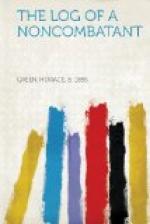Monday, October 5th, the night before the city emptied itself of non-combatants, was almost a festive occasion at the St. Antoine. The British entry gave tremendous confidence to the stricken city and the tired Belgian soldiers—a bit of pride before the fall. New faces turned up, friends in the English army met, shook hands, and discussed the outlook. One was even reminded of lighter occasions, such as the Copley-Plaza in Boston or the Hotel Taft in New Haven before an annual Harvard-Yale battle. At the head of a long table in the center of the dining-room sat the First Lord of the British Admiralty, looking rather thoughtful, his baldish head and Trinity House uniform standing out in contrast to the service uniforms of the younger men around him. At the same table were commissary officers, sergeants, aide-de-camps, Hugh Gibson, Harold Fowler, and somewhat farther down the Russian Minister and my curly-headed officer, chatting over his coffee with little Princess de Ligne.
In the flash of an eye these scenes changed to scenes of terror.
The news leaked out, and spread like wildfire, that the Kaiser’s men had crossed the River Nethe and had placed their big guns within range of the city. It was not until forty-eight hours later that the populace saw a handful of Flemish posters pasted in out-of-the-way corners—posters signed by the Civil Government—which thanked the populace “for retaining until the present time their praiseworthy sangfroid, and regretting that the responsibilities of their office necessitated their own removal to a neighborhood more safe.”
Queen Elizabeth, whom danger made a democrat, walked right into my hotel, if you please, and stopped casually to say good-bye to the Russian Minister. The crowd outside did not know she was leaving for Ostend under cover of darkness—they cheered her loudly just the same. She is a spunky sort of queen.
Then came the flight. You knew the fear of the Germans had got into their blood when waiters dropped their plates and dishes and ran; when shops, houses, hotels closed and the people melted away; when the French chambermaid besought with frightened eyes that Monsieur take her away to England, and when the hotel proprietor disappeared without even asking for his bill.
There were other sights that did one good to see: such as gray-haired Mrs. Richardson, venerable figure of a British nurse, with six wars to her credit and a breastful of decorations from four different governments, who refused to leave her hospital even if it was blown to pieces, so long as there were men to help and wounds to heal.
When the St. Antoine closed I took her to the American Consulate to find a house where she could stay. That night and the next loads of English Red Cross busses with their households of pain and ether rumbled over the pontoon bridge across the Scheldt, went past Fort Tete de Flandre, and disappeared in the swampy meadows on the road to Ghent. I never saw her again, but I have always hoped that Mrs. Richardson was among the nurses who went with them.




